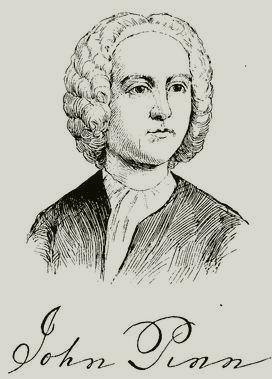
John Penn, North Carolina Delegate to the Second Continental Congress, was born in Carolina County, Virginia in 1741. Penn did not come from a particularly wealthy background and practiced law in Virginia until 1774, when he moved to Granville County, Carolina. Penn was elected to North Carolina’s delegation between the first and second Continental Congresses when Richard Caswell resigned in September, 1775.[1] Some have argued that Caswell was elected by the North Carolina Provincial Congress in order to ensure that east-west tensions in North Carolina did not escalate.[2]
Penn’s service at the Congress was by no means remarkable. He did not receive a Committee appointment until two months after the beginning of the Congress. He was eventually appointed to the Qualification or Application Board, which was responsible for reviewing men who wanted to be commissioned as officers in the American army. [3] However, Penn was the first delegate from North Carolina to support independence.[4] In July of 1776, Penn and the other North Carolina delegates signed the Declaration of Independence.
Penn’s underwhelming performance in Congress, combined with his lack of popularity and prominence in North Carolinian politics led to North Carolina’s provincial congress replacing him as a delegate to the Continental Congress with Thomas Burke, a rising political star, in late 1776. By April of 1777, Penn managed to regain a seat in the Continental Congress by accusing long time delegate Hewes of violating North Carolina’s constitution by being both an agent of the Secret Committee and being a delegate to the Continental Congress.[5] The provincial congress sent Penn to the Continental Congress instead of Hewes in 1778, where he served until 1780.[6]
Penn’s time in Congress continued to be marked by relative inaction and he may have been pre-occupied with the Philadelphia night life, which interfered with his congressional duties. [7] During the Revolutionary War, Penn served on North Carolina’s Board of War, where his actions helped to salvage his reputation, and when he died in 1788 at the age of 47 he was moderately wealthy and in good social standing.[8]
Works Cited
Mays, Terry M., The A to Z of the American Revolution. Lanham, Maryland: The
Scarecrow Press, 2007.
Morgan, David T. and William J. Schmidt. “From Economic Santions to Political
Separation: The North Carolina Delegation to the Continental Congress, 1774-
1776.” The North Carolina Historical Review Vol. LII, 3 (1975): 215-234.
[1] David T. Morgan and William J. Schmidt, “From Economic Sanctions to Political Separation: The North Carolina Delegation to the Continental Congress, 1774-1776,” The North Carolina Historical Review Vol. LII, 3 (1975): 224.
[2] Ibid., 225.
[3] Ibid., 226
[4] Ibid., 47-48.
[5] Ibid., 233-234.
[6] Terry M. Mays, The A to Z of Revolutionary America. 219.
[7] Morgan and William, “The North Carolina Delegation,” 233.
[8] Ibid., 233-234.
Works Cited
Mays, Terry M., The A to Z of the American Revolution. Lanham, Maryland: The
Scarecrow Press, 2007.
Morgan, David T. and William J. Schmidt. “From Economic Santions to Political
Separation: The North Carolina Delegation to the Continental Congress, 1774-
1776.” The North Carolina Historical Review Vol. LII, 3 (1975): 215-234.
[1] David T. Morgan and William J. Schmidt, “From Economic Sanctions to Political Separation: The North Carolina Delegation to the Continental Congress, 1774-1776,” The North Carolina Historical Review Vol. LII, 3 (1975): 224.
[2] Ibid., 225.
[3] Ibid., 226
[4] Ibid., 47-48.
[5] Ibid., 233-234.
[6] Terry M. Mays, The A to Z of Revolutionary America. 219.
[7] Morgan and William, “The North Carolina Delegation,” 233.
[8] Ibid., 233-234.
EDIT: This was submitted by Chris Parsons
No comments:
Post a Comment